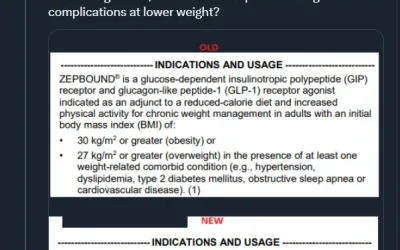GLP-1 Medications Q&A: Everything You Need to Know About Medical Weight Loss Treatment

Glucagon-like peptide-1 receptor agonist (GLP-1RA) medications have reshaped how obesity can be clinically treated, especially as certain drugs have gained FDA approval in the last few years. Multiple clinical studies suggest that this class of drugs can be helpful in supporting long-term weight loss, especially for people who have repeatedly tried weight loss methods without seeing sustained results.
The following guide will help you learn more about GLP-1 medications, how they work as part of a healthy weight loss plan and whether they’re right for you. It is for informational purposes only. Always talk to your healthcare provider before starting any medications or treatments.
What Are GLP-1 Medications?
GLP-1 receptor agonists are a class of medications that help manage blood glucose levels and treat obesity. Originally approved to help treat type 2 diabetes, researchers and clinicians found that this group of medications was also contributing to weight loss by decreasing appetite and increasing satiety.
Recently, more doctors have been using GLP-1 medications to address obesity. As of November 2024, Wegovy, Saxenda and Zepbound have been FDA-approved for use as a weight loss treatment.
Other medications such as Ozempic and Mounjaro have been approved for treating type 2 diabetes but may be used off-label for treating obesity as well.
Most GLP-1 medications come as prefilled injection pens that require once a week injections, although specific medications may vary. Initial doses are typically low to see if the medication is effective, as well as to ensure there are no serious side effects. A doctor will then increase or adjust dosages as needed as the treatment continues.
How Do GLP-1 Medications Work?
Glucagon-like peptide 1, or GLP-1, is a hormone that your small intestine naturally produces. It has several important functions throughout your body:
-
Brain Effects: GLP-1 hormones activate areas in your brain responsible for appetite, satiation, reward and movement. They can help you feel fuller and more satiated after eating, as well as reduce appetite and cravings, all of which may help you lose weight when using GLP-1 drugs.
-
Heart Benefits: GLP-1 hormones tend to decrease blood pressure, especially in patients with type 2 diabetes or hypertension. Using GLP-1 drugs may reduce the risk of developing cardiovascular disease or experiencing a heart attack.
-
Liver Health: GLP-1 hormones help regulate levels of liver fat and enzymes attributed to liver damage. 70% of people with diabetes have non-alcoholic fatty liver disease (NAFLD). Losing weight and using GLP-1 agonists can both help regulate and improve liver function.
-
Pancreatic Function: The pancreas is the organ in your body that makes and releases insulin, which lowers your body’s blood sugar levels after eating, keeping it within normal range. GLP-1 hormones help regulate insulin levels and reduce insulin resistance, lowering the risk of developing type 2 diabetes.
In general, GLP-1 RAs work by binding to GLP-1 receptors throughout the body, replicating these natural hormones and their functions. Certain medications, such as Mounjaro, bind to both GLP-1 and gastric inhibitory polypeptide (GIP) receptors. GIP is another hormone in your body that works similarly to GLP-1 hormones, while also reducing stomach acid secretion and fat accumulation.
Do GLP-1 Medications Work Without Making Other Lifestyle Changes?
Before starting to use GLP-1 medications, it’s vital to understand that they are not meant to be the sole treatment for obesity, nor do they cure or solve obesity. These medications are meant to support your weight loss journey and require other lifestyle changes to work as an effective weight loss solution.
In conjunction with taking medication, patients should also maintain lifestyle changes such as exercising regularly and eating a balanced diet that includes whole grains, vegetables, lean meats, and other unprocessed foods.
Individuals taking these medications should also prioritize getting more quality sleep every night, reducing sources of stress, and accessing mental health care to support and treat underlying conditions such as depression or anxiety.
Are GLP-1 Medications a Fad Weight Loss Treatment?
If you’ve watched the news or looked on social media this year, GLP-1 drugs may seem like they’re the latest, greatest weight loss trend. Everyone from talk show hosts to online influencers seems to be using them to lose significant amounts of weight.
With so many fads coming and going in the weight loss industry over the years, there is naturally a lot of curiosity, skepticism and misunderstanding when it comes to these drugs. Are they actually useful in promoting and sustaining weight loss?
GLP-1 medications are not a fad, despite all of their recent media attention.
How Much Weight Can Someone Lose with Medication?
Multiple studies suggest that adding GLP-1 medications to a weight loss plan can result in significant weight loss. In a 68-week-long trial conducted by Wadden et al., 86.6% of participants taking semaglutide lost at least 5% of their body weight, as opposed to 31.5% in the placebo group. All participants also changed their diet and received intensive behavioral therapy.
It is important to note before starting on any GLP-1 medication that weight loss is not guaranteed. It is also not guaranteed that you will lose a certain amount of weight. Every person’s body reacts to treatment differently, and some people may not lose significant amounts of weight.
What are the Potential Side Effects of GLP-1 Medications?
Side effects may occur in up to 50% of patients taking GLP-1 medications. Most are mild or moderate and temporary as you adjust to the medication or dosage, and may include:
-
Nausea
-
Diarrhea or constipation
-
Vomiting
-
Stomach pain
-
Bloating
-
Fatigue
-
Dizziness
Can GLP-1 Medications Be Taken Short-Term?
Many people who are considering GLP-1 medications are concerned about needing to stay on them long-term and wonder if they can be used as a short-term solution.
Research shows that GLP-1 medications work only as long as you’re taking them, making them a long-term solution. They are not meant to be a quick-fix drug that patients can easily go off of in a year.
Weight gain is commonly seen in most people who stop taking GLP-1 medications. One 2022 study by Wilding et al. treated people with a weight loss drug for 68 weeks, then subsequently withdrew them from the drug. After one year, participants on average had regained two-thirds of their prior weight.
Who is Eligible for GLP-1 Medications?
Not everyone is a good candidate for these medications. Typically, healthcare professionals will only prescribe them to patients who have repeatedly tried other weight loss methods without success or sustained results.
In general, individuals with a BMI of 30 or higher, or individuals with a BMI of 27 or higher who have one or more weight-related health conditions (such as type 2 diabetes or hypertension) are the most likely to be eligible for medication.
How Much Do GLP-1 Medications Cost?
Even if a patient is qualified for GLP-1 medications, there is a significant barrier to entry: cost.
GLP-1 medications are prohibitively expensive for many people. List prices in the U.S. can range from $1000 to $1500 per month. Even with insurance, over half of all people using these medications have struggled to pay for them. 22% expressed that it was “very difficult” to cover costs.
Many insurance plans do not cover or severely limit access to comprehensive, affordable obesity care. Helpful treatment options and therapies often come with stipulations, and many people do not end up getting the care they need to live happier, healthier lives.
Telehealth platforms specializing in obesity care are aiming to change that by offering people affordable, flexible treatment across the country. Healthcare providers recognize that cost of treatment is a serious barrier to many people. They can work with you to find a solution you can afford that also meets your needs and health goals.
Final Word
GLP-1 medications are here to stay and getting more popular every year, especially as more drugs receive FDA approval. With strong evidence that they can help support significant weight loss, GLP-1 medications show great promise for the future of treating obesity and associated diseases.
GLP-1 RAs are not an instant cure-all drug, nor are they right for every person. For some people though, they can act as a helpful tool to support weight loss, along with other lifestyle changes like diet and exercise. If you’re wondering if GLP-1 medications could be right for you, talk with your healthcare provider to discuss potential treatment options.
Ready to learn more about GLP-1 medications and whether they might be right for you? Schedule a consultation with Accomplish Health today!
Disclaimer: This blog post is for informational purposes only and should not be considered medical advice. Please consult with a qualified healthcare professional before starting any weight management program or medication.
References
-
FDA. FDA Approves New Drug Treatment for Chronic Weight Management, First Since 2014. FDA. Published June 4, 2021. Read More
-
FDA. FDA Clarifies Policies for Compounders as National GLP-1 Supply Begins to Stabilize. U.S. Food and Drug Administration. Published October 22, 2024. Read More
-
Klein H. Most Insured Adults Still Have to Pay at Least Part of the Cost of GLP-1 Drugs. AJMC. Published May 16, 2024. Read More
-
Nevola R, Raffaella Epifani, Imbriani S, et al. GLP-1 Receptor Agonists in Non-Alcoholic Fatty Liver Disease: Current Evidence and Future Perspectives. 2023;24(2):1703-1703. doi:10.3390/ijms24021703
-
Park A. Half of the U.S. Population Will Be Obese by 2030. Time. Published December 18, 2019. Read More
-
Seino Y, Fukushima M, Yabe D. GIP and GLP-1, the two incretin hormones: Similarities and differences. Journal of Diabetes Investigation. 2010;1(1-2):8-23. doi:10.1111/j.2040-1124.2010.00022.x
-
Wadden TA, Bailey TS, Billings LK, et al. Effect of Subcutaneous Semaglutide vs Placebo as an Adjunct to Intensive Behavioral Therapy on Body Weight in Adults With Overweight or Obesity: The STEP 3 Randomized Clinical Trial. JAMA. 2021;325(14):1403-1413. doi:10.1001/jama.2021.1831
-
Wilding JPH, Batterham RL, Davies M, et al. Weight regain and cardiometabolic effects after withdrawal of semaglutide: The STEP 1 trial extension. Diabetes, Obesity and Metabolism. 2022;24(8):1553-1564. doi:10.1111/dom.14725
Stay in the loop.
"*" indicates required fields
Interested in becoming a patient?



